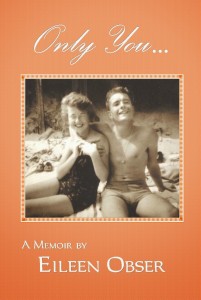Eileen Obser is a writer and editor and has been teaching creative  writing in New York for over 20 years. She is a graduate of the MFA program in Creative Writing and Literature at Stony Brook University Southampton. Her stories and personal essays have been published in many magazines, anthologies and newspapers, including The Washington Post and The Philadelphia Inquirer Magazines, Newsday, The Boston Globe, The Village Voice, The East Hampton Star, Proteus, and The Southampton Review literary magazines. Here are here thoughts on “On Finishing a Book.”
writing in New York for over 20 years. She is a graduate of the MFA program in Creative Writing and Literature at Stony Brook University Southampton. Her stories and personal essays have been published in many magazines, anthologies and newspapers, including The Washington Post and The Philadelphia Inquirer Magazines, Newsday, The Boston Globe, The Village Voice, The East Hampton Star, Proteus, and The Southampton Review literary magazines. Here are here thoughts on “On Finishing a Book.”
I recently completed a short novel, Two Rooms, Shared Bath, based on my 30-plus years experience as a landlady. I first wrote this in 2008, for an MFA novella class taught by writer Roger Rosenblatt. Roger and my colleagues loved the story, as did Ursula Hegi, the novelist, and her students, in a fiction class the following year. The first draft came to me quickly, based on real characters who were bed & breakfast guests or tenants over the years. And when I say “characters” that’s exactly what they were – strangers who stayed short-term or long, with strong, often annoying, personalities I don’t believe I could have made up. It’s a mainstream novel, funny in parts, and not so funny, too.
After completing my MFA in 2010 (I went back to school later in life) I concentrated on other work and put Two Rooms aside. The thought of spending more time writing about such disagreeable tenants simply did not appeal to me. I wanted the memory of them to go away, so the book was moved to a carton in the basement.
 In 2012 I resurrected Two Rooms briefly; I did some revisions, rallied up some enthusiasm and excitement; but the thrill was soon gone and, once more, the novel was shelved downstairs. I finished Only You, a memoir published in 2014 by Oak Tree Press, another book that had spent years being revised, rejected, and in hiding.
In 2012 I resurrected Two Rooms briefly; I did some revisions, rallied up some enthusiasm and excitement; but the thrill was soon gone and, once more, the novel was shelved downstairs. I finished Only You, a memoir published in 2014 by Oak Tree Press, another book that had spent years being revised, rejected, and in hiding.
Six months ago Two Rooms beckoned me again. This time around I really dug in, and enjoyed the process. Now, after much editing, it’s almost set to go. So how do I feel — how do any of us feel – when our books, fast-written or long and slow in the making, are done? I like to quote the writer, Dani Shapiro (Devotion: a Memoir and Still Writing: the Perils and Pleasure of the Creative Life) who recently blogged that the very sentence, “I’ve just finished my new book” haunts her “with a sense that I must be lying, that the book can’t be finished.” I understand what she’s saying and thinking, just like so many of us writers must. We have to go back to it, over and over, “revise, chisel, hone, clarify . . . make it better until we can no longer make it better.”
And that’s where I am now. I do not plan on putting Two Rooms back into storage; I’m getting too old to put manuscripts on hold like that. I’ll soon “abandon it to the world,” as Shapiro states. Two more books are waiting for me, plus essays and whatever else comes into this writer’s head.
I’d love to know if those who read this also have books in hiding, or half-drafted, or almost ready but worry: are they really worth the time and effort. Self-doubt can be a real handicap in our world. No one may be anxiously awaiting our hidden masterpieces but we really must resist the temptation to say “who cares?” and get on with it. We care. We put ourselves into the thinking, the researching, and the writing, and surely we deserve to see the finished products of our imaginations. We must find those hidden treasures and bring them back into the light.
JIM: A great treatise on a moment all writers face. Tell us about your experiences in this situation. The book is finished – or am I willing to call it finished?

Your post found it’s way to my in box, via James Callan, at just the right time. I have four novels finished and on hold for, from one to two years. I’m honestly not sure why I parked them but I do know that a couple of weeks ago I established an order of resurrection and began working through the first one on the list, Southern Investigation – Tucson, a sequel to Southern Investigation.
Frankly, I like the book more now than I did then and with what I’ve learned while it was sitting, I expect it to make it all the way through the gauntlet this time around.
Thanks for the great post and I wish you the best and I’m excited about reading Two Rooms – soon?
I had the first two manuscripts I wrote in hiding for about 10 years before I dug them out and finally had the courage to self-publish them. I’m doing better selling these than my books with publishers, so don’t shelve your work too long!
Thanks for your input, Lesley. That was very smart of you to self-publish, and I love knowing that these books are doing better than the traditionally published ones.
Before my first novel was published, I attempted to write two others, not mysteries. After writing X number of pages, I lost interest and so I abandoned them. In my case, that was a good thing.
When the idea for “Mixed Messages” came to me, it was a different “story.” I knew this was the book I wanted to write and, as it turned out, it blossomed into a series. For me, those first two books were never meant to be written.
Sometimes, in the immortal words of Kenny Rogers, “You gotta know when to hold ’em; know when to fold ’em.”
I hear you, Patricia. I’ve got two novels that I “holded”, but eventually folded, down there in the basement. Once every few years I look them over, thinking: should I take this upstairs and give it another shot? But I don’t, and won’t. May they rest in peace. I can’t throw them out, however; I just never know if there’s an idea, a memory, an inspiration in those pages.
I read the first couple of paragraphs and went to Amazon looking for your book. I was going to purchase it and was disappointed to return to the blog and read on down to discover that it’s yet ready!
As I stated in my recent post, my next project is to turn a secular suspense series I wrote into Christian fiction. I made more money off of that series than I’ve made off of all my Christian fiction books combined, but it feels good to be coming back home to Christian fiction. My problem is that I’m short on time. I’m currently working on my second graduate degree while working full-time.I’m currently working on plot structure and adding another character who will be the core of the restructure to the CBA market.
Thanks for writing. I’m glad to know I’ll have at least one reader lined up at Amazon when the book gets published! Be easy on yourself. You might like “The Art of Slow Writing” by Louise DeSalvo, which mentions many well-known writers who, for various reasons, had to write slow — but who got the work done eventually. Good luck to you!
I’m currently re-editing the first three books I wrote! I can’t believe they were so BAD!! After this time, I’m never going to read them again for fear I’ll be forced to re-edit for a 4th time!!
Your blog really hit home!! So glad I’m not alone.
No, you’re not alone, Ann. And I’m very glad to hear from you. Good luck with your revisions and with your future work, too.
Eileen-
I recently submitted for publication a novel I furst started writing in 2000. After more than a hundred pages written, the logistics if moving my characters through historical events had me stumped, so off to the shelf it went. Off and on through the ensuing years, I’d pull it out, make a little progress, and then back to the shelf it went. Last year I decided this had gone on long enough. A major decision to change the planned ending resulted in a finished novel. Not Bound By Blood is due for publication this summer.
I’m glad that you persevered, Gay, and that your book will be coming out this year. We’re not alone, we writers who work really slow, or so it seems. Time does bring about decisions that help our writing, as you just proved to yourself with the new ending. Thanks for replying, and thanks to Jim Callan, for inviting me to blog this week.